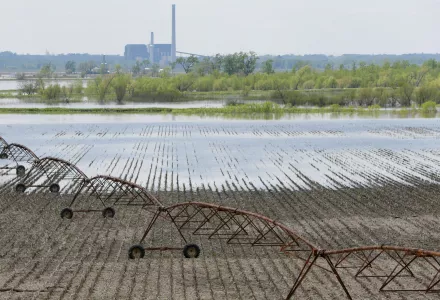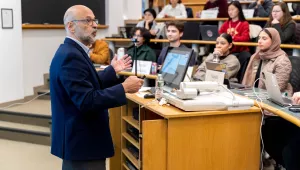
Belfer Center research director examines recent assessment from entire U.S. intelligence community
Rising temperatures and intensifying weather due to climate change, along with the unlikelihood of meeting the 2030 emissions goals of the Paris Agreement, will exacerbate geopolitical tensions, social instability, and the need for humanitarian aid, according to a joint report by the U.S intelligence community last month. The National Intelligence Estimate lays out the likely security implications over the next two decades of the mounting climate crisis. Calder Walton is assistant director for research at the Belfer Center's Intelligence Project, which organized Harvard Kennedy School's first conference on climate change and national security last spring. He spoke to the Gazette about the report and the important role the intelligence community should play in addressing the crisis. Interview is edited for clarity and length.
Q&A
Calder Walton
GAZETTE: We hear about the threats posed by climate change from an environmental standpoint, but rarely about the risks and threats it poses to national security. How does the U.S. intelligence community view climate change, and is this a new domain?
WALTON: The purpose of the U.S. intelligence community, established after the Second World War in the wake of Pearl Harbor, was to provide policymakers with decision advantage and forewarning of threats to national security. If the primary purpose is to give decision advantages about national security threats, obviously, by definition, the U.S. intelligence community has to have a role giving key decision-makers their assessments about the greatest existential threat in human civilization: climate change. What is going to be the impact of changing climate on national security, economic society, civil society? And this isn't just national security; this is international, globalized security. If we look at it like that, clearly, the U.S. intelligence community has to have a role. And they're very, very late to the game.
GAZETTE: How are other intelligence services responding to climate change? Is any country leading the way?
WALTON: I don't think anyone is a shining star in terms of taking this seriously. I have yet to find an example of a country that has an intelligence bureaucracy set up to really deal with this and to provide assessments about the national security implications of climate change to policy leaders in a sufficient way.
The overwhelming focus of intelligence communities across the globe is still on post–Cold War structures — stealing other people's secrets. And we are now in an age of globalized challenges, the primary one being climate change, but also the bio revolution and biosecurity, cyber, and disinformation. Climate change and pandemics are linked; climate change will, scientists tell us, create more new disease outbreaks. And then, add in synthesized biology; we have cyber, artificial intelligence, and machine learning. These are globalized challenges that will affect societies across the world.
We are really at an inflection point in terms of the way that we understand intelligence and national security. U.S. national security and intelligence were built up to deal with blocs of states, first the fascist states and then Soviet communism. Nine-eleven was the first wake-up call about non-state actors, but the U.S. intelligence community still used the same framework of established bureaucracies built up in postwar years to deal with non-state actors. And now, with a pandemic and climate change, we're seeing truly globalized challenges. It seems to me that we need to rethink how we understand intelligence to deal with it, geared to sharing global intelligence to deal with global challenges we face....
Pazzanese, Christina."How Climate Change Will Impact National Security." Harvard Gazette, November 24, 2021
The full text of this publication is available via Harvard Gazette.





